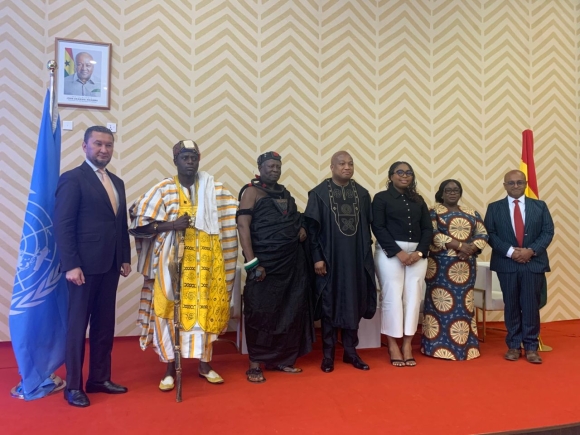The Minister of Foreign Affairs, Samuel Okudzeto Ablakwa, has called for reforms to international financial institutions as a crucial step toward ensuring sustainable development and equitable financing for developing countries.
He said such reforms must include changes to the voting structures of the International Monetary Fund (IMF) and the World Bank to guarantee that developing economies play a meaningful role in global decision-making.
Mr Ablakwa warned that without addressing the structural inequities embedded in the global financial system, it would be difficult to advance the 2030 Agenda for Sustainable Development or meet the targets of the Paris Agreement.
The Foreign Affairs Minister made the call at the UN@80 High-Level Dialogue organised by the United Nations (UN) Country Office in collaboration with the Ministry of Foreign Affairs. The event brought together members of the diplomatic corps, government officials, heads of state agencies and departments, and traditional leaders.
Trapped in debt
Mr Ablakwa reiterated President John Mahama’s call for reform of the global financial architecture, insisting that the current structures were biased against Africa.
“Too many developing nations remain trapped in cycles of unsustainable debt, while the promise of fair access to capital and trade remains elusive. As President John Dramani Mahama rightly reminded the international community at the 80th Session of the UN General Assembly, ‘we demand not only a reform of the Security Council, but also a reset of the global financial architecture, which is currently rigged against Africa’,” he said.
He noted that this demand echoed the collective voice of the Global South for a more balanced and just system of global governance — one that gives all nations an equitable say and a fair opportunity in shaping their shared economic future.
Mr Ablakwa also urged the UN to continue championing financial justice by advocating for debt relief, sustainable investment, and innovative financing mechanisms that empower developing nations to invest in their own growth.
He further emphasised that predictable, concessional, and climate-sensitive financing must become the cornerstone of renewed multilateralism that prioritises people and the planet over politics and profit.
Mr Ablakwa added that although the challenges confronting the world were complex, they were not insurmountable if nations acted together, guided by the principles of solidarity, inclusivity, and shared responsibility that lay at the heart of the UN.
He affirmed that the future of multilateralism would depend not only on institutional reform and financial equity but also on the collective courage to build trust, deepen cooperation, and uphold the ideals of peace, justice, and sustainable development for all.
Cooperation
For his part, the UN Resident Coordinator, Zia Choudhury, underscored the importance of dialogue, cooperation, and multilateralism in building a better future for all.
Mr Choudhury highlighted the devastating consequences of global conflict, citing World War II, which claimed an estimated 50 to 60 million lives directly and up to 85 million in total.
He stressed that progress toward a peaceful and prosperous future required shared responsibility, strong partnerships, and renewed commitment to multilateral cooperation. He also commended Ghana for being a consistent and reliable partner in upholding the ideals of the UN.
World challenges
The UN Resident Coordinator identified pressing global challenges, including climate change, displacement, inequality, misinformation, and the erosion of institutions established to maintain peace and justice. He said these challenges required coordinated and decisive action, adding that institutions such as the UN and the International Criminal Court (ICC) now faced critical tests of credibility.
Mr Choudhury called for stronger collaboration between countries and the UN to reaffirm commitments to peace and security by preventing conflict and tackling its root causes.
He also urged accelerated climate action, particularly in vulnerable regions across Africa, and the promotion of inclusive development to ensure that young people, women, and marginalised communities were not left behind.
Mr Choudhury further encouraged nations to uphold the rule of law and human rights as a foundation for fair and accountable governance.

